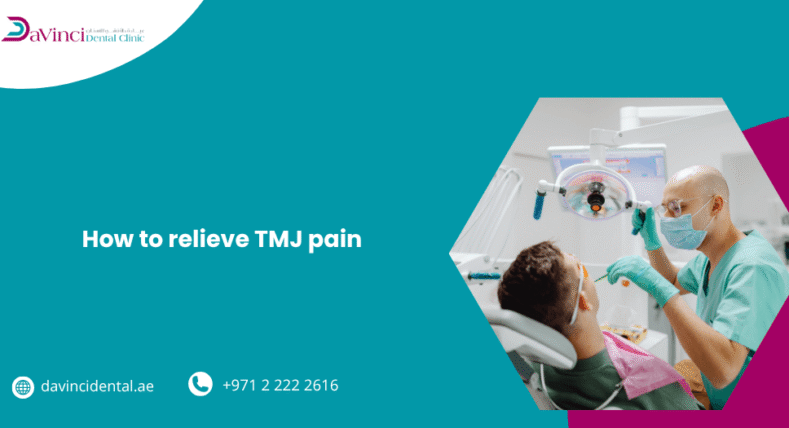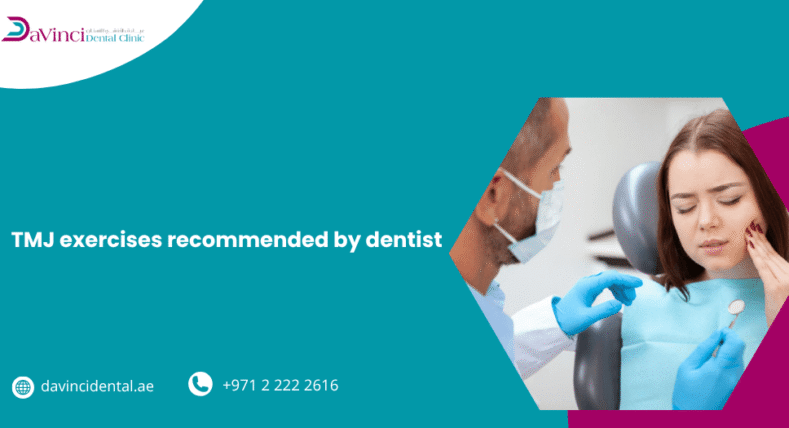Your everyday life might be greatly impacted by having jaw discomfort, headaches, or trouble chewing. TMJ disorder, which affects the temporomandibular joint, that connects your jaw to your skull, may be the cause of these symptoms.
You should get professional help if you are having trouble with these problems. Thankfully, you can access specialized care from the best TMJ dentist in Abu Dhabi at Davinci Dental Clinic.
In this article, we’ll explore the causes and symptoms of TMJ disorder, possible home treatments, and expert treatment options.
Table of Contents
TMJ Disorder Causes
There are many possible causes of TMJ dysfunction, including:
- Injury to your head, neck, or jaw.
- Orthodontic treatments.
- Teeth grinding and jaw clenching that can be related to stress and anxiety.
- Joint deterioration, typically brought on by osteoarthritis.
- Other conditions, such as fibromyalgia, gout, or rheumatoid arthritis.
- Dental problems, like an uneven bite from recent fillings or dentures.
- You may have TMJ problems for no apparent reason.
TMJ Disorder Symptoms
Joint sounds, discomfort, and irregular jaw motions can all be signs of TMJ dysfunction. TMJ problems can cause you to have:
- An aching pain in front of your ear.
- Difficulty opening or closing your mouth.
- Difficulty yawning.
- A clicking or grating sound when you open your mouth or chew.
- An uncomfortable or uneven bite.
- A headache (particularly in the temples, under your eyes, and at the sides of your lower jaw).
- Jaw discomfort or pain, especially when eating.
- Shoulder, neck, or ear discomfort
Home Treatments of TMJ Disorder
There are a few things that you can do on your own at home to help relieve the TMJ disorder symptoms. Your doctor might ask you to try one or more of these remedies together:
- Take over-the-counter drugs: Ibuprofen and other nonsteroidal anti-inflammatory medicines (NSAIDs) help reduce muscular soreness and swelling.
- Apply cold packs or hot water: The dentist may recommend a treatment that involves covering the affected area with a warm towel or an ice pack.
- Steer clear of excessive jaw movements: Don’t shout, sing, or do anything that makes you open your mouth widely; instead, minimize your chewing and yawning.
- Try to keep your teeth slightly apart as much as possible: Your jaw will feel less pressure as a result.
- Don’t use your teeth as tools: You should stop the habit of opening packages or tearing tags off of clothes with your teeth.
Professional TMJ Disorder Treatments
Here are some of the most common treatments for TMMJ disorder:
- Medications: If you need more NSAIDs to relieve pain and swelling, your dentist can prescribe them. If you clench or grind your teeth, they may recommend a muscle relaxant to ease your jaw, or they may recommend an anti-anxiety drug to reduce tension, which can trigger TMDs.
- A night guard or splint: It is a device that covers your upper and lower teeth to prevent them from touching. By realigning your teeth, you improve your bite and minimize the consequences of clenching or grinding.
- Dental work: When the biting surfaces of your teeth are balanced, your TMJ disorder symptoms might lessen. So, your dentist may use crowns, bridges, or braces in addition to replacing missing teeth.
Other Available Treatments For TMJ Disorders
In the event that none of the previous treatments work, your dentist could recommend one or more of the following:
- Transcutaneous electrical nerve stimulation: This treatment relaxes the muscles in your face and jaw joint by using low-level electrical currents. It can be done at home or in the dentist’s office.
- Ultrasound: Applying deep heat to the joint might increase mobility or reduce pain.
- Injections at trigger points: Tender face muscles known as “trigger points” are injected with anesthetic or painkillers to provide comfort.
- Radio waves: The joint is stimulated by radio waves, which improve blood flow and reduce pain.
- Low-power laser treatment: This helps you open your mouth wider and move your neck more freely while reducing discomfort and inflammation.
Best TMJ dentist in Abu Dhabi
If you are searching for the best TMJ dentist in Abu Dhabi, then you’ll find them at Davinci Dental Clinic.
In addition to determining the root cause of your jaw discomfort, our expert TMJ dentists will create a customized treatment plan based on your unique requirements.
Whether you have chronic pain or only little discomfort, coming to our clinic in Abu Dhabi can help you improve your quality of life and prevent additional issues.
Contact us today, and start the journey to a pain-free life.
Read More: TMJ specialist in Abu Dhabi.
Conclusion
TMJ disorder can significantly impact your daily life with its uncomfortable symptoms such as persistent jaw pain, headaches, and difficulty chewing.
While home remedies may offer temporary relief, you still need to get professional help to achieve long-term results.
Davinci Dental Clinic, which has the best TMJ dentist in Abu Dhabi, offers advanced diagnostic equipment, skilled care, and a customized treatment plan made to meet your unique requirements.
Don’t let TMJ disorder limit your comfort or well-being. Schedule your consultation right now to start along the path to long-lasting relief and better jaw health.
Read More: TMJ Therapy Clinic In Abu Dhabi.
Frequently Asked Questions
What type of dentist is best for TMJ?
A board-certified orofacial pain specialist is the ideal professional to consult. This is the newest area of dentistry and covers almost anything that might hurt the head, neck, and especially the TM joint.
What is the most successful treatment for TMJ?
Treatments may involve transcutaneous electrical nerve stimulation (TENS) and ultrasonography in addition to jaw muscle strengthening and stretching exercises. Additionally, the dentist can suggest a few exercises to do at home, such as stretching and applying hot water, as these work well when used often throughout the day.
Can a normal dentist treat TMJ?
General dentists are specialists in treating TMJ issues because they have received the necessary training in the anatomy and physiology of the jaw. To help their patients who are experiencing TMJ discomfort, general dentists can provide them with a variety of treatment alternatives.




